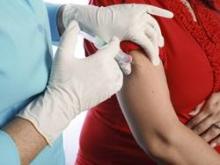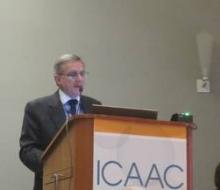WASHINGTON – Immunizing expectant mothers with the Tdap vaccine booster shot resulted in higher cord serum levels of pertussis toxin antibodies, according to a study from Argentina.
"The results of this study [indicate] that children would be protected from pertussis until they receive the usual immunization schedule," study coauthor Dr. Aurelia Fallo, a researcher at the Hospital de Niños Dr. Ricardo Gutiérrez, Buenos Aires, said in an interview.
The Tdap vaccine for pregnant women was introduced in Argentina in 2012 to help decrease infant morbidity and mortality, according to Dr. Eduardo Lopez, director of pediatric infectious diseases at the hospital, who presented the data during the annual Interscience Conference on Antimicrobial Agents and Chemotherapy.
This was the first Latin American study to measure the effect of maternal vaccination with Tdap, he said. Argentina’s recommended schedule for maternal Tdap vaccination is during the third trimester before gestational week 38. Since 2011, the U.S. Centers for Disease Control and Prevention also has recommended that pregnant women receive the Tdap vaccine, after 20 weeks’ gestation.
At a single site in Buenos Aires, Dr. Fallo, Dr. Lopez, and their colleagues took serum samples and maternal cord serum samples at delivery from 88 mothers immunized with the Tdap vaccine. The investigators also took serum samples and maternal cord serum samples at delivery from 108 pairs of non–Tdap-immunized mothers. Serum samples were drawn from 69 nonpregnant women controls as well.
While all of the study participants, including controls, had received their full Tdap vaccination schedules as children, it wasn’t until 2011 that Argentina added the Tdap booster at 11 years of age to the national immunization schedule; therefore, except for the mothers who had received the maternal booster shot, no one in the study had been immunized against pertussis since the age of 6 years, Dr. Fallo said.
In the United States, the Tdap booster is recommended at age 11 years, with Td booster shots to follow every 10 years.
The mean age for all mothers was 26 years. Mothers who received their Tdap booster did so on average at gestational week 25 (standard deviation, 6 weeks).
Each mother/cord sample pair was blinded and measured for IgG-PT (pertussis toxin) antibodies using a validated enzyme-linked immunosorbent assay (ELISA) test. A measurement of 5 EU/mL was considered protective.
The mean concentration of IgG-PT in maternal cord sera taken from vaccinated mothers was 57.2 EU/mL, versus 12.3 EU/mL in unvaccinated mothers (P less than .001).
The mean concentration of IgG-PT in the vaccinated serum samples taken at delivery was 41.1 EU/mL. For the nonimmunized group, the mean IgG-PT concentration was 10.7 EU/mL (P less than .0001).
In the nonimmunized group, 19% had IgG-PT serum levels of less than 5 EU/mL, compared with 2.3% of the mothers who had been immunized (P = .001). Less than 5 EU/mL of IgG-PT was found in 3% of controls (P = .004).
The placenta antibody ratio in immunized mothers was 1.39, versus 1.1 for nonimmunized mothers (P = .01).
According to Dr. Lopez, there was a significant difference for mothers vaccinated before the third trimester, when the mean concentration of IgG-PT was 25.8 EU/mL, compared with the mean 41.9 EU/mL of IgG-PT for mothers in the third trimester (P = .002).
In all, Dr. Lopez said these data indicated that the maternal Tdap vaccination program in Argentina had greatly reduced infant mortality there. "When you compare the mortality rates from 2011 to 2013 in Argentina, there is an 87% reduction," he said. The number of pertussis-related infant deaths went from 76 in 2011 to 10 in 2013, according to official Argentina Ministry of Health records.
"The key point is that maternal Tdap immunization after 20 weeks of gestation seems to be a good strategy to protect infants," Dr. Fallo said.
On Twitter @whitneymcknight



